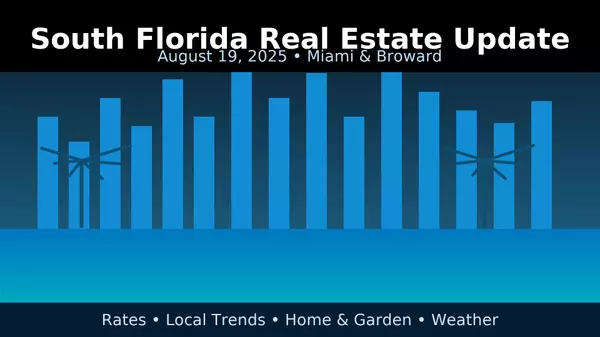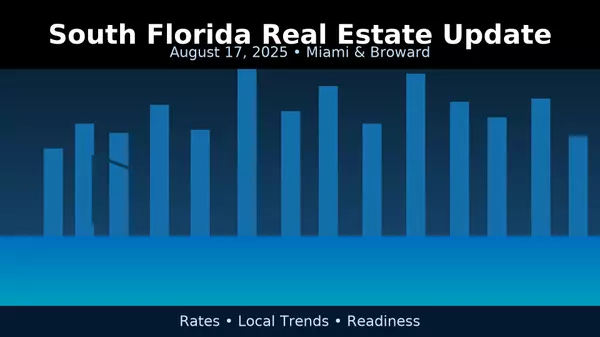
Planning Your Home Purchase in Miami: A Comprehensive Guide to Down Payments and Closing Costs
Purchasing a home in Miami is an exciting venture, but it also requires financial foresight and planning, especially when it comes to accumulating the necessary funds for a down payment and closing costs. In Miami's dynamic real estate market, understanding your financial obligations and the various mortgage options available, such as FHA loans with low down payments, is crucial. This expanded guide aims to equip potential homebuyers with the knowledge needed to effectively save and plan for their home purchase.
Understanding Down Payments
A down payment is a percentage of your home's purchase price that you pay upfront. It's one of the most significant financial aspects of buying a home.
Conventional Down Payments:
- Standard Expectations: The traditional advice is to save 20% of the home’s purchase price for a down payment.
- Advantages: A higher down payment typically means lower monthly mortgage payments, reduced interest costs over the life of the loan, and avoidance of Private Mortgage Insurance (PMI).
Exploring Low Down Payment Options
A 20% down payment can be a substantial amount, especially in a market like Miami. Fortunately, there are several low down payment mortgage options available:
FHA Loans:
- Minimum Down Payment: As low as 3.5% if you have a credit score of 580 or higher.
- Features: Backed by the Federal Housing Administration and ideal for first-time homebuyers.
Other Low Down Payment Programs:
- VA Loans: No down payment required, available to veterans, active-duty service members, and some spouses.
- USDA Loans: Zero down payment loans for eligible rural and suburban homebuyers.
- Conventional 97 Loan: Offered by Fannie Mae, allowing down payments as low as 3%.
Navigating Closing Costs
Closing costs are the additional fees and expenses you pay when finalizing your mortgage. They vary depending on the lender and the property.
Typical Closing Costs Include:
- Origination and Underwriting Fees: Charged by the lender for processing the mortgage.
- Title Insurance: Ensures the property title is legitimate.
- Appraisal Fee: For an independent evaluation of the property’s value.
- Home Inspection Fee: To assess the property’s condition.
- Credit Report Fee: Charged for pulling your credit reports.
- Escrow Fees: Paid to the party handling the closing process.
Calculating How Much to Save
Step-by-Step Savings Calculation:
- Budget for the Home: Start by determining the price range of homes you’re interested in.
- Down Payment Calculation: If opting for an FHA loan, calculate 3.5% of the home’s price. For conventional loans, aim for 20%.
- Closing Costs: Estimate 2-5% of the loan amount for closing costs.
- Extra Expenses: Factor in additional costs like moving, immediate home repairs, or furniture.
Savings Example:
- Home Price Estimate: $300,000
- FHA Down Payment (3.5%): $10,500
- Estimated Closing Costs (3%): $9,000
- Total Initial Savings Goal: $19,500 (not including other expenses)
Additional Financial Considerations
When planning your home purchase, consider these additional factors:
Emergency Savings:
- Maintain an emergency fund separate from your home-buying savings to cover unexpected expenses post-purchase.
Long-Term Affordability:
- Consider the ongoing costs of homeownership, including property taxes, homeowners insurance, and maintenance.
Mortgage Pre-Approval:
- Before house hunting, get pre-approved for a mortgage to understand how much you can borrow and strengthen your buying position.
Conclusion
Saving for a home in Miami, particularly for the down payment and closing costs, requires a clear understanding of your financial options and obligations. By exploring various mortgage options like FHA loans and accurately calculating your required savings, you can approach the home-buying process with confidence and clarity.
Embarking on Your Miami Home-Buying Journey
With careful planning, research, and financial management, purchasing your dream home in Miami can be a smooth and fulfilling experience. Remember, the path to homeownership is unique for each buyer, so consider your personal financial situation and long-term goals as you plan your home purchase.











